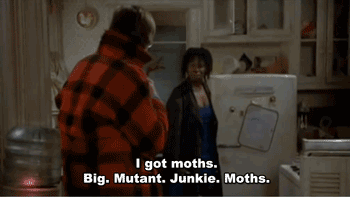 A tremendous amount of romance fiction is a collection of tropes. This does not mean the genre is superficial or shallow. A tremendous amount of New York Times bestseller "literary" books are superficial renderings of supposedly "deep" topics. (Use enough expository prose: it's amazing how many people will considered a book insightful!)
A tremendous amount of romance fiction is a collection of tropes. This does not mean the genre is superficial or shallow. A tremendous amount of New York Times bestseller "literary" books are superficial renderings of supposedly "deep" topics. (Use enough expository prose: it's amazing how many people will considered a book insightful!) Tropes are a handy way of conveying concepts, plot points, and character without too much expository prose. I'm a big fan! However, writers should be careful of depending on tropes (or rather stereotypes) to do their writing for them.
Every genre attracts people trying to make a living by generating readable material. I have a great deal of sympathy for this avocation, so I generally refrain from castigating poor writers on my blogs. If I provide a name, that author is worth checking out, even if I criticize elements of that author's writing (except Ayn Rand).
So . . . what I have noticed generally is that authors who produce both historical and contemporary novels don't always produce the same quality of work in both genres. One romance aficionado I came across claimed that authors who try to return to a genre (go back to historical romance from contemporary romance, for instance) struggle to get back into the tone/world; their writing is never as good the second time around.
I have a second theory: among the current authors I am reading, the historical novels far excel the contemporary ones (with exceptions). I've wondered if one reason could be that history forces the writer to create a real problem.
With contemporary romances, it appears a tad too easy for the problem to revolve on "I don't have a significant other for Christmas (or Valentine's Day)...I have a tough boss that I secretly crush on...A third party is messing up my romance..."
 |
| A spy movie where cleverness makes the tropes sing! |
With historical fiction, yeah, writers also fall back on tropes (and nobody in the world did them better than Georgette Heyer). But history also forces a writer to find a historical problem around which to arrange the plot. Take, for instance, Sarah Granger's A Minor Inconvenience in which the spy issue revolves on Wellington and Napoleon.
It's not the spying that grounds the novel; I've read contemporary spy romance novels where I never could figure out who the mark was supposed to be. Such novels are rather like watching a James Bond movie where the only focus is Q's cool toys. Fun! But not terribly substantial.
But Wellington and Napoleon and homegrown traitors? Instant substance! And Granger handles them well. Likewise McGraw's YA novel Mara: Daughter of the Nile, rather than revolving around generic ancient Egyptian icons, revolves around Queen Hephaestus. The history may not be entirely accurate but it's far more interesting than a group of tropes without context about a spy and her handler.
Starting with a substantive problem reminds me of Flash, Season 1. I maintain that one reason it is so good is that the writers were forced to focus on a consistent villain (Wells, played magnificently by Cavanagh). Starting with a strong protagonist with an interesting, tough problem by its nature demanded equally strong writing.
Likewise, sorting through a complicated historical problem to find an issue that allows for romance and character development entails the kind of writing that builds on a trope rather than getting buried by one. And, too, I've found that historical problems seem to force a degree of objectivity that modern politics do not. Easier to attach labels in the present than in the past. And labels don't make for good stories. And it's always good for writers to remember that.
